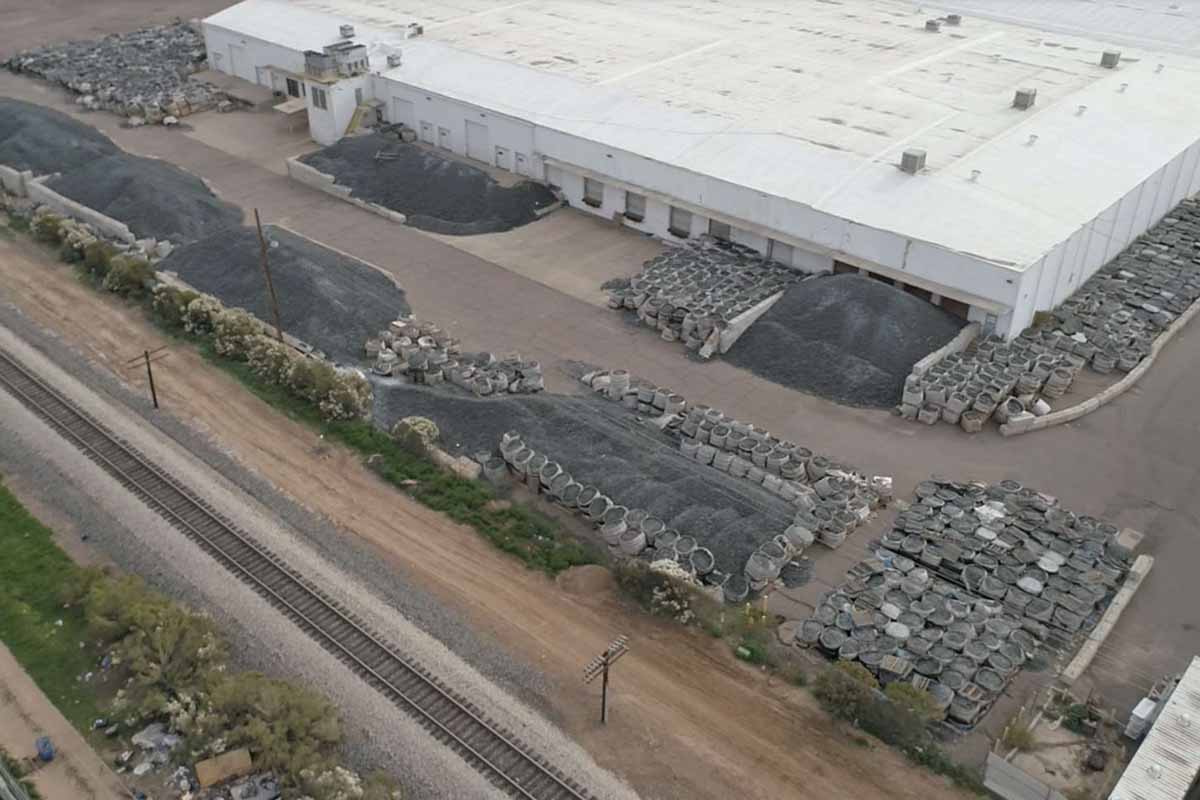
As of June 2024, Arizona landlords of former Closed Loop sites have recovered $10.8 million toward the cost of cleaning up CRT stockpiles left by the company. | Photo from a cleanup plan prepared by Wood Environment & Infrastructure Solutions.
A number of processors that supplied cathode ray tube glass to multiple Arizona warehouse locations leased by failed downstream outlet Closed Loop Refining and Recovery have settled in a major lawsuit filed by the landlords of the property.
The Arizona lawsuit, filed jointly by four property management firms in October 2022, listed 49 e-scrap companies who allegedly sent CRT materials to the warehouses, and it sought to collect cleanup costs from those companies. Cleanup of the CRT materials, which can contain lead and other hazardous components, often involves delivering the material to landfills.
The legal action sought more than $15 million in cost recovery, and as of June 2024, the property owners have recouped $10.8 million.
Closed Loop began leasing the facilities in 2010, and by the time the company failed in 2016, it had amassed 106 million pounds of CRT materials across both properties, legal records indicate. That material remained stockpiled at the warehouses after the company collapsed, and state regulators began working with the property owners to remove the CRT material in 2020, continuing into 2021.
Lawyers for the landlords argued that under the federal Comprehensive Environmental Response, Compensation and Liability Act, known as CERCLA or the Superfund law, the suppliers that shipped material to Closed Loop are liable for a portion of cleanup costs.
It’s the same legal argument landlords successfully used in a separate massive legal action connected to Closed Loop’s even larger Ohio stockpiles. At three Columbus warehouses, Closed Loop stockpiled more than 150 million pounds of CRT materials, and the landlords sued dozens of e-scrap firms, eventually collecting more than $16 million for the cleanup.
More than a year and a half after the Arizona lawsuit was filed, some e-scrap firms have settled, others are continuing to negotiate with the property owners, and some have been dismissed from the suit because they are no longer active or have not been able to be served with legal notice.
Most recently, lawyers for the property owners asked the court to extend the date for e-scrap defendants to respond to July 8, and the court agreed. The property owners said in legal documents they are in negotiations with between five and seven additional e-scrap defendants “for another $750,000 to $1 million in potential settlement proceeds.”
Settlements to date
Shortly after the suit was filed, defendant California Electronic Asset Recovery, which sent 14.9 million pounds to the warehouses, settled for $1.14 million, and Federal Prison Industries, operating as UNICOR, agreed to pay $995,000 to cover the 14.4 million pounds it sent.
In early 2023, IMS Recycling, the largest supplier to the Arizona sites with 72.5 million pounds delivered, agreed to pay $5 million to settle the suit, the largest payment to date.
Later in 2023, settlements were reached by:
- Desert Art (sent 10,400 pounds, settled for $25,000).
- eGreen-IT (sent 60,800 pounds, settled for $25,000).
- E-Waste (sent 2.4 million pounds, settled for $182,111).
- Cal Micro (sent 10.3 million pounds, settled for $705,000).
- Monitor and CRT Recyclers of California (sent 25.6 million pounds, settled for $1.94 million).
- GEEP Canada/GEEP USA (sent 4.14 million pounds, settled for $240,000).
- Global Electronic Recycling (sent 15,000 pounds, settled for $25,000).
Last month, additional settlements were reached with these companies, representing an additional $575,000 in settlement payments and $25,000 in in-kind payment:
- Round2, through its successor company Avnet (sent 4.3 million pounds, settled for $324,700).
- Dynamic Lifecycle Innovations (sent 327,700 pounds, settled for $25,000).
- CompuPoint (sent 71,700 pounds, CompuPoint agreed to physically remove 120 gaylord boxes of CRT materials, which the parties agreed is equivalent to $25,000 in removal costs).
- FMI Recycling (sent 97,400 pounds, settled for $25,000).
- Attan Recycling (sent 4.7 million pounds, settled for $200,000).
Earlier this year, the court dismissed several e-scrap defendants from the lawsuit, noting they were either defunct companies or otherwise “continue to evade service.” These companies were:
- Advanced Computer Recycling.
- All E-Waste, Inc.
- Environmental Coordination Services and Recycling, Inc.
- eWaste Center, Inc.
- E-World Recyclers.
- Executive Recycling Services.
- Global Surplus Solutions.
- Greenview Resource Management.
- Precise Recycling Services.
- Scrapcomputer.com USA.
- Texas Green Electronic Recycling.
- Tung Tai Group.
- YNot Recycle.
The companies that have not settled or been dismissed are:
- Ace Metal Corporation.
- AK Recycling Incorporated.
- Alianza Recycling and Recovery.
- All Green Electronics Recycling.
- American Retroworks Incorporated.
- California Electronic Waste.
- Cinco Electronics Recycling Incorporated.
- Danny Ewaste.
- Eco International.
- Electronic Recycling Solutions.
- E-Waste Recyclers of Colorado.
- Global eRecyclers Incorporated.
- KYO Computer Incorporated.
- Magic Recycling.
- OC Recycling Incorporated.
- PC Recycle.
- Southwest Recycling Solutions.
- Tri Products Incorporated.
- U.S. Micro Development Corporation.
- VTKK.
- Gold’n West Surplus Incorporated.
The companies currently have until July 8 to respond to the lawsuit.

